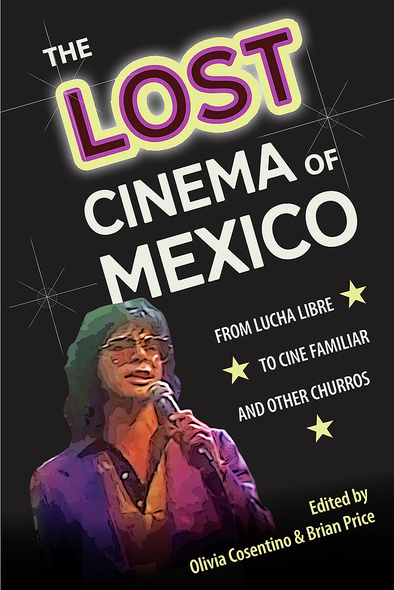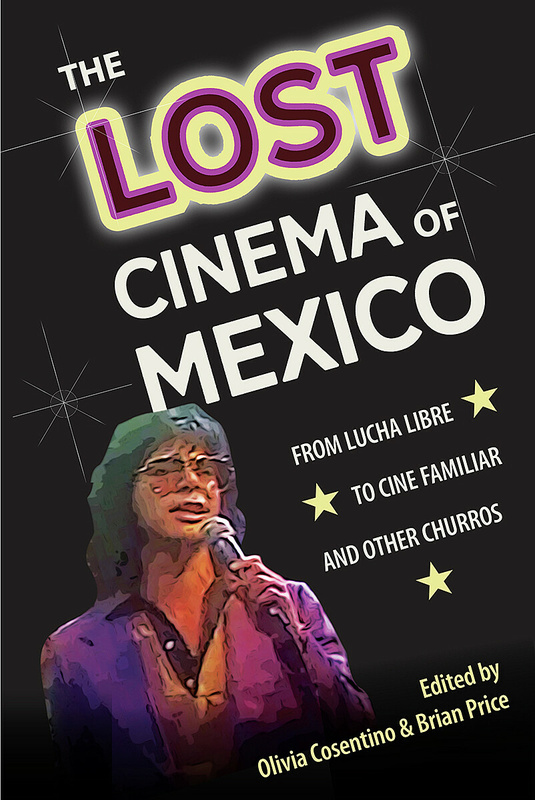
The Lost Cinema of Mexico
From Lucha Libre to Cine Familiar and Other Churros
The Lost Cinema of Mexico is the first volume to challenge the dismissal of Mexican filmmaking during the 1960s through 1980s, an era long considered a low-budget departure from the artistic quality and international acclaim of the nation’s earlier Golden Age. This pivotal collection examines the critical implications of discovering, uncovering, and recovering forgotten or ignored films.
This largely unexamined era of film reveals shifts in Mexican culture, economics, and societal norms as state-sponsored revolutionary nationalism faltered. During this time, movies were widely embraced by the public as a way to make sense of the rapidly changing realities and values connected to Mexico’s modernization. These essays shine a light on many genres that thrived in these decades: rock churros, campy luchador movies, countercultural superocheros, Black melodramas, family films, and Chili Westerns.
Redefining a time usually seen as a cinematic “crisis,” this volume offers a new model of the film auteur shaped by productive tension between highbrow aesthetics, industry shortages, and national audiences. It also traces connections from these Mexican films to Latinx, Latin American, and Hollywood cinema at large.
A volume in the series Reframing Media, Technology, and Culture in Latin/o America, edited by Héctor Fernández L’Hoeste and Juan Carlos Rodríguez
Contributors: Brian Price | Carolyn Fornoff | David S. Dalton | Christopher B. Conway | Iván Eusebio Aguirre Darancou | Ignacio Sánchez Prado | Dolores Tierney | Dr. Olivia Cosentino
Publication of this work made possible by a Sustaining the Humanities through the American Rescue Plan grant from the National Endowment for the Humanities.
Offers fascinating readings of forgotten films of the 1960s, ’70s, and ’80s. From female wrestlers to Black superstars and from chili westerns to family films, this book reveals a hidden cinematic world that will fascinate and educate Mexicanists, film scholars, and fans alike.’—Paul Julian Smith, author of Multiplatform Media in Mexico: Growth and Change Since 2010‘Marvelous. One of the most important books published on Mexican cinema in a long time.’—Emily Hind, author of Dude Lit: Mexican Men Writing and Performing Competence, 1955–2012
Olivia Cosentino is Zemurray-Stone Post-Doctoral Fellow at the Stone Center for Latin American Studies at Tulane University. Brian Price is professor of Spanish at Brigham Young University. He is the author of Cult of Defeat in Mexico’s Historical Fiction: Failure, Trauma, and Loss and the editor of Asaltos a la historia: Reimaginando la ficción histórica hispanoamericana.
Contents
Foreword vii
Maren Linett
List of Abbreviations xiii
Introduction: Disability Writing Joyce 1
Jeremy Colangelo
1. Two Sides of Hemiplegia: On the Affect of Paralysis in Dubliners 25
Jeremy Colangelo
2. “Limping and Devious”: The Disabled Male Body in “A Mother” 45
Casey Lawrence
3. When the Personal Becomes Historical: Portrait and the Textual Memory of Childhood Trauma 66
Boriana Alexandrova
4. Debility as Disability: Disorderly Eating in A Portrait of the Artist as a Young Man 91
Kathleen Morrissey
5. “Dark Men in Mien and Movement”: Blindness and the Body in Ulysses
106
Rafael Hernandez
6. Degeneration, Decadence, and Joyce’s Modernist Disability Aesthetics 131
Marion Quirici
7. Boulez, Cage, and the Disabled Wake 156
John Morey
8. Joyce, Swift, and the “Creep o’er Skull” of the Gods 181
Giovanna Vincenti
9. The Anti-Erasure of Lucia Joyce: Resignification of Mad Histories in
Finnegans Wake 200
Jennifer Marchisotto
List of Contributors 223
Index 225





